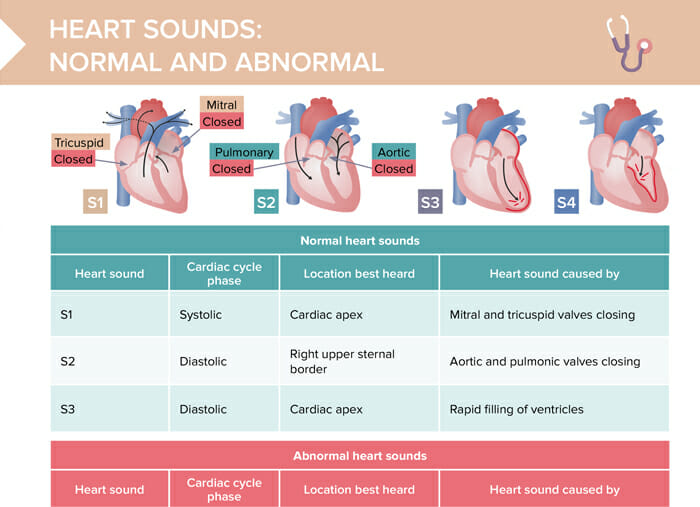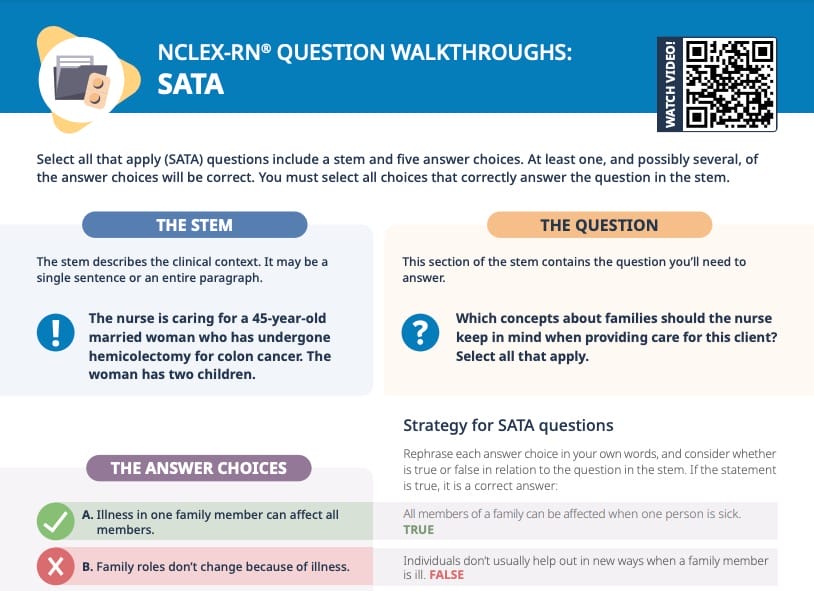Systematically grasp the question stem
Who is in the question?
There is a nurse and one client that the nurse cares for. If it was a delegation question, there may be other healthcare personnel, or client family members. Make sure you know the participating persons and your role in the question (= the RN).
What information is in the question?
The client has had a myocardial infarction in the past. It is not specified how long ago this happened.
What is the question actually asking?
Even though the information about the client is that they have had a myocardial infarction, this is not what the question is about. The focus of the question is which assessment findings most concern the nurse regarding heart failure. The myocardial infarction may have caused the damage, but it is not directly relevant to the question itself.
Recall what you know about heart failure
In heart failure, the heart is unable to pump blood efficiently. This can cause a variety of symptoms (depending on if it is right-sided vs left-sided).
Particularly concerning assessment findings include:
- Respiratory symptoms indicating pulmonary edema
- Swelling in the extremities (edema)
- Palpitations (can show worsening HF)
- Cyanosis (indicating poor oxygenation)
- Abnormal blood pressure
- Decreased urine output (reduced renal perfusion → oliguria)
Decide for each answer choice separately: Is this a concern for a patient with heart failure?
A. Chronically elevated blood pressure measurements
Untreated hypertension causes high afterload. The heart has to push against high pressure, causing backflow and worsening heart failure. So, this would definitely be a concern regarding heart failure. → This answer applies.
B. Bilateral 3+ pitting edema on the lower extremities
Pitting edema 3+ is a sign of significant right-sided heart failure. Blood backs up in the veins, causing edema in the liver and the lower extremities, worsening heart failure, and would be a concern for the nurse. → This answer applies.
C. Left ventricular hypertrophy noted on the chest X-ray
Left ventricular hypertrophy shows that the left ventricle is trying hard to push blood out to the rest of the body against high systemic pressure and is starting to remodel and getting bigger due to not being efficient enough, and indicates worsening heart failure. → This answer applies.
D. Pulmonary edema noted on the chest X-ray
Pulmonary edema is a sign that the left ventricle cannot push effectively against the systemic high pressure and blood backs up into the lungs. This keeps them from exchanging CO2 and O2 effectively, which negatively impacts the whole body, indicating worsening heart failure. So, this is also definitely a concern for this patient with heart failure. → This answer applies.
Tip: Pulmonary edema is one of the worst-case scenarios with heart failure.
E. Evidence of new myocardial infarction on cardiac catheterization
The question stem told us that the client has already previously experienced myocardial infarction. In this answer choice, there is evidence of a new myocardial infarction on top of that. Suffering another myocardial infarction causes further damage to the heart, indicating worsening heart failure. For a client who already is in heart failure, another MI is definitely a big concern. → This answer applies.
Recap: Don’t second guess yourself!
In this question, all five answer choices need to be selected as correct. This is maybe not common, but just as likely and normal as only one answer choice being correct, or 2, 3, or 4. Don’t doubt yourself based on how many crosses you think look likely – treat every answer choice as a separate question and trust your judgment.

